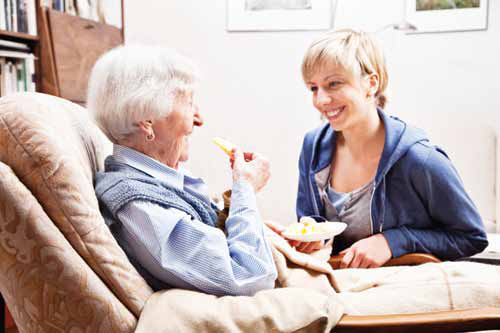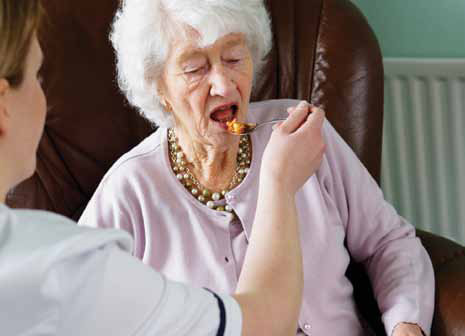Risk Feeding
The following general information is provided for your consideration before a decision is made about whether risk feeding is appropriate for you or your loved one. Life threatening health complications may result from risk feeding. Always seek the advice of your doctor before deciding to risk feed. Your doctor will discuss the risks and benefits specific to you associated with risk feeding and talk about alternatives.
Give yourself plenty of time to think about the risks and benefits, and to review and ensure you understand any information provided by your doctor. Also take the time to have any additional questions answered before deciding to risk feed.
What is safe swallowing?
Safe swallowing involves the efficient, timely and coordinated transport of food, fluid and saliva from the mouth through the throat to the stomach. During safe swallowing the chances of choking should be very small.
What is unsafe swallowing?
The normal eating and swallowing process may become unsafe for a number of reasons. There may be problems with the muscles of the mouth, throat, or oesophagus (food pipe) or the messages that are sent from the brain to these muscles. Swallowing problems (dysphagia) may result from stroke, Parkinson's disease, dementia, various other neurological disorders (multiple sclerosis, motor neurone disease, etc.), surgery or radiation (for mouth, throat, or oesophageal cancer), and even the aging process.
Signs and symptoms of dysphagia include, but are not limited, to coughing or choking when eating or drinking, gurgly or wet voice after swallowing, difficulty initiating a swallow, feeling that food is stuck in the throat, weight loss because eating is difficult or unpleasant, food going down "the wrong way" and frequent chest infections.
When a swallowing problem is present there may be a high risk of food, fluid and saliva entering the wind pipe or lungs. This is known as aspiration. It can be an uncomfortable feeling for a person to experience although sometimes a person may be unaware that it is happening (silent aspiration). Aspiration can also be dangerous because it can cause pneumonia (an infection in the lungs).
How is unsafe swallowing managed?
- An initial swallowing evaluation by a Speech Pathologist trained in dysphagia assessment and management is advisable. Medical tests such as an X-ray of the swallow (Modified Barium Swallow) or Fiberoptic Endoscopic Evaluation of Swallowing (FEES) may be ordered if indicated
- Adjusting the texture of food and thickness of fluids
- Postural changes and training in swallowing techniques that reduce the risk of aspiration during eating and drinking.
- Exercises to improve the strength and coordination of muscles involved in chewing and swallowing
- Biofeedback
- Staying nil by mouth
- Tube feeding
- Surgery (rarely indicated).
. .
.
Can a person choose to continue eating and drinking with an unsafe swallow?
Any legally competent adult can choose to continue eating and drinking accepting the risk of swallowing related health complications. Some people are not prepared to give up the comfort that comes from the taste and texture of food and fluids even when eating and drinking results in coughing/choking episodes and aspiration. This is known as "risk feeding".
Risk feeding may also be necessary in situations where there has been no improvement in safe oral intake following usual swallowing management strategies and when tube feeding is not thought to be in the person's best interests.While accepting it is unsafe and that there is some risk, allowing a person to continue eating and drinking, especially if they gain enjoyment from this, may be preferable to a feeding tube and staying "nil by mouth".
In some cases risk feeding may be recommended when it is not medically possible to insert a feeding tube due to gastrointestinal issues or anaesthetic risk.
Risk feeding is more likely to occur when there is a combination of the following:
- A medical condition which is not curable
- When preferred diet takes priority over swallow safety
- Severe swallowing problem where the cause is not reversible
- No expected improvement in swallow ability
- Swallowing therapy has been unsuccessful in restoring safe swallow
- Tube feeding is declined or is not felt to be appropriate.
The decision to risk feed should always be made following medical advice.
What if my loved one can't make his/her own decisions?
When an adult cannot make his/her own health care decisions because of illness, coma or mental impairment the doctor turns to the family, legal guardian, or person appointed as a health care power of attorney to make decisions. This is called substitute decision making. Feeding decisions can be very difficult and emotional for families when a loved one no longer has the ability to eat and drink safely. You may experience feelings of guilt, feelings of pressure from others or feelings of conflict between your personal wishes and what you think your loved one may want.
How can I do what's best for my loved one in this situation?
The decision to risk feed requires careful thought based on a person's individual circumstances. Practical factors to consider include:
- Underlying medical condition and likely prognosis/life expectancy
- Quality of life
- Cultural, religious and personal beliefs
- The person's wishes
- The person's best interests when substitute decision making is required
- Goals of care.
Who can help?
Swallowing problems are best managed by a team of health professionals including a speech pathologist, dietitian and doctor, in consultation with the person and their family and carers. Other specialists may also be involved depending on the cause of the swallowing problem (eg.neurologist, gastroenterologist, ear nose and throat specialist, radiologist, oncologist).
The team can clearly explain the benefits and risks of various feeding management options and discuss possible effects on quality of life of the person and their carers.
Feeding decisions can be difficult and emotionally overwhelming. Families and carers want to know that their decision is right and loving and consistent with the person's wishes. It is important to know that the health care team is there to support and assist patients, families and carers so that the best possible decision can be made.
A good place to start is with a swallowing assessment. Ask your doctor or health care team for a referral to a speech pathologist.

Disclaimer
This information is for consumer educational use only and should not be used as a substitute for, medical advice, diagnosis or treatment. This information does not constitute the practice of any medical, nursing or other professional health care advice, diagnosis or treatment. Mater Misericordiae Ltd advise users to always seek the advice of a physician or other qualified health care provider with any questions regarding personal health or medical conditions. Never disregard, avoid or delay in obtaining medical advice from your doctor or other qualified health care provider because of something you have read in this document. If you have or suspect that you have a medical problem or condition, please contact a qualified health care professional immediately. If you are in the Australia and are experiencing a medical emergency, please call 000 or call for emergency medical help on the nearest telephone.
Produced by the Speech Pathology Department
Mater Hospital Brisbane
Raymond Terrace, South Brisbane Q 4101
Telephone 07 3163 8111
© 2012 Mater Misericordiae Health Services
Brisbane Limited. ACN 096 708 922
Mater acknowledges consumer consultation in the development of this patient information.
Mater Doc Num: PI-CLN-420033
Last modified 09/8/2017.
Consumers were consulted in the development of this patient information.
Last consumer engagement date: 19/7/2014
For further translated health information, you can visit healthtranslations.vic.gov.au/ supported by the Victorian Department of Health and Human Services that offers a range of patient information in multiple languages.